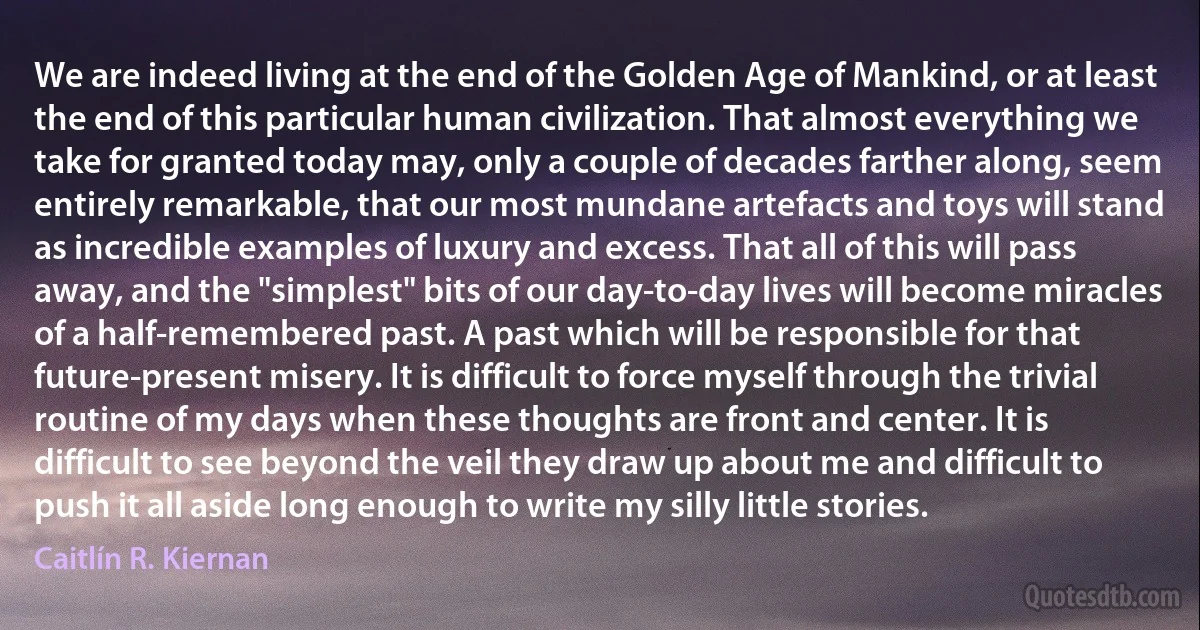
We are indeed living at the end of the Golden Age of Mankind, or at least the end of this particular human civilization. That almost everything we take for granted today may, only a couple of decades farther along, seem entirely remarkable, that our most mundane artefacts and toys will stand as incredible examples of luxury and excess. That all of this will pass away, and the "simplest" bits of our day-to-day lives will become miracles of a half-remembered past. A past which will be responsible for that future-present misery. It is difficult to force myself through the trivial routine of my days when these thoughts are front and center. It is difficult to see beyond the veil they draw up about me and difficult to push it all aside long enough to write my silly little stories.
Caitlín R. KiernanRelated topics
age almost aside beyond couple draw end enough everything excess force front golden human least lives living misery mundane pass past push see silly stand take write today days day-to-dayRelated quotes
If you drive a nation to adopt procedures which run counter to its instincts, you weaken and may destroy the motive force of its action...You will realise that I am speaking of the frequent suggestion that the United Kingdom should join a federation on the continent of Europe. This is something which we know, in our bones, we cannot do...For Britain's story and her interests lie far beyond the continent of Europe. Our thoughts move across the seas to the many communities in which our people play their part, in every corner of the world. These are our family ties. That is our life: without it we should be no more than some millions of people living in an island off the coast of Europe, in which nobody wants to take any particular interest.

Anthony Eden
In the past you rivalled the Achaians and the Macedonians, peoples of your own race, and Philip, their commander, for the hegemony and glory, but now that the freedom of the Hellenes is at stake at a war against an alien people (Romans), ...And does it worth to ally with the barbarians, to take the field with them against the Epeirotans, the Achaians, the Akarnanians, the Boiotians, the Thessalians, in fact with almost all the Hellenes with the exception of the Aitolians who are a wicked nation... ...So Lakedaimonians it is good to remember your ancestors,... be afraid of the Romans... and do ally yourselves with the Achaians and Macedonians. But if some the most powerful citizens are opposed to this policy at least stay neutral and do not side with the unjust.

Polybius
Economists, like everyone, have their political biases, but these are by no means as strong an influence on what they are willing to consider as you might think. For example, one might have thought that strongly liberal economists like, say, James Tobin would be at least mildly sympathetic to the views of radical economists who draw their inspiration from Marx, or of heterodox economic thinkers like Galbraith. After all, in such fields as history and sociology the Marxist or post-Marxist left has long received a respectful hearing. And yet you don't find this happening: liberal economists are almost as quick as their conservative colleagues to condemn heterodox leftist ideas as foolish it was the liberal Robert Solow, not Milton Friedman, who defended orthodoxy in the bitter "capital controversy" with British radicals.

Paul Krugman
That God is quoted verbatim, that God is said to be speaking (when, in fact, he is being spoken for) points to either the remarkable arrogance of the biblical contributors or their unshakeable conviction that their access to the deity was total.
The fateful, and perhaps even unwitting, manipulation performed by the Hebrew Bible is to have convinced its readers that what stands in front of them is not a hodgepodge of texts worked over by countless men position across time and motivated by mundane political and theological interests. Instead, it presents itself as a self-evident treasury of the actual words, though, actions, political opinions, and future aspirations of Yahweh. From early on, apparently, interpreters wholly swallowed this argument.

Jacques Berlinerblau
As a theorist I have great advantages. All I need is a pencil (now a ball pen) and an empty pad of paper. There are analysts who sit and look vacantly out the window, but after the age of 20 I was not one of them. I ought to envy the new generation who have grown up with the computer, but I don't. None of them known to me sits idly at the console, improvising and experimenting in the way that a composer does at the piano. That ought to become increasingly possible. But up to now, in my observation, the computer is largely a black box into which researchers feed raw input and out of from which they draw various summarizing measures and simulations. Not having access to look around in the box, the investigator has less intuitive familiarity with the data than used to be the case in the bad old days.

Paul Samuelson
